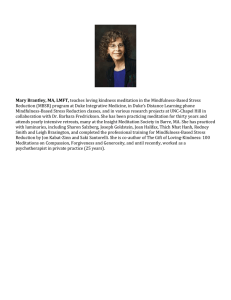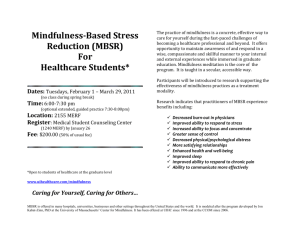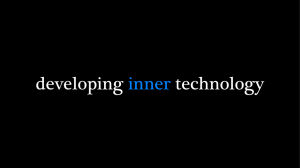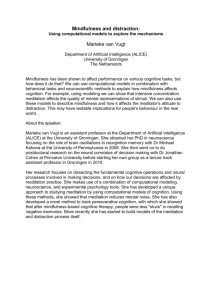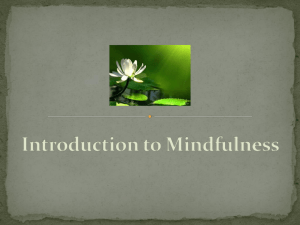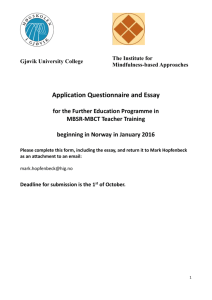File - Stephanie Kimbrel MSN Portfolio
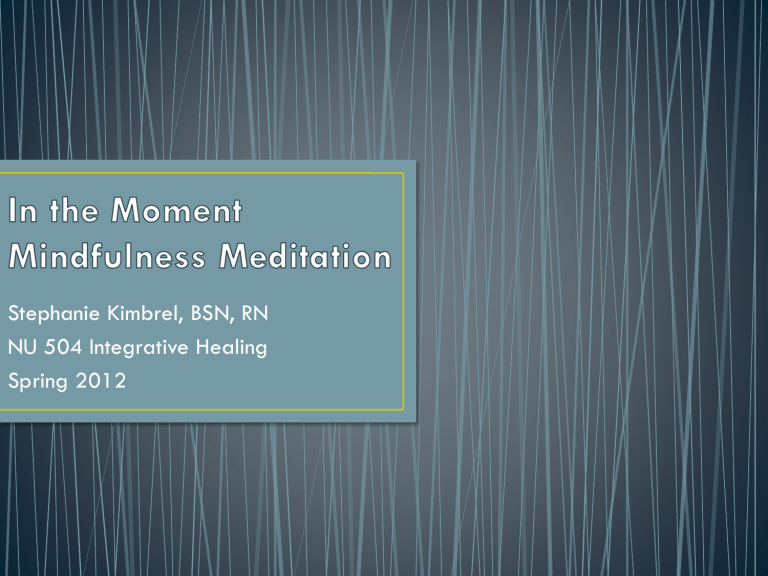
Stephanie Kimbrel, BSN, RN
NU 504 Integrative Healing
Spring 2012
• Mindfulness meditation is moment to moment awareness.
• It is being fully awake.
• It involves being here for the moments of our lives, without striving or judging.
• Bringing our fullness of attention into anything is mindfulness.
• Experience your life
• Present to love, or experience peace, or joy, or contentment
• Acceptance/releasement towards things
• Relaxed state of awareness the observes both your inner world of thoughts, feelings and sensations, and the outer world of constantly changing phenomena without trying to control anything.
(Meditation, 2012)
• Eastern philosophy
• Buddhism
• Thich Nhat Hanh
• Mind-body medicine
• Western Medicine
• Behavioral Science
• Disease state
• Kabat-Zinn: Mindfulness-Based Stress Reduction (MBSR)
• Sympathetic Nervous system
• Mobilizes body for action
• Fight or flight response
• Increases in breathing, heart rate, blood vessels narrow
• Parasympathetic nervous
• Relaxation
• Slows heart and breathing rate, blood vessels to dilate
• Increased Regional gray matter
• Left hippocampus:
• learning and memory process; and emotional regulation
• Posterior cingulate cortex
• Integration of self-referential stimuli in the emotional and autobiographical context of one’s own person
• Temporo-parietal junction
• Conscious experience of self, unity of self and body
• Cerebellum
• Regulation of emotion and cognition
• Formal Practice
• Sitting meditation
• Walking meditation
• Yoga, chi gong, tai chi
• Informal Practice
• Meditate as we do what we do
• MBSR
• Meditation training course
• 8 week long training finishing with full day of mindful meditation
• An extensive Review of Literature was performed during the
Spring of 2012 to obtain research studies on Mindfulness meditation.
• Databases and resources:
• Cumulative Index to Nursing and Allied Health Literature (CINAHL),
PubMed, MEDLINE, Ovid SP, National Guideline Clearinghouse, Cochrane
Collaboration’s systematic reviews
• websites of ClinicalTrial.org, the Agency for Healthcare Research and
Quality, NCCAM
• KEYWORDS
• Mindfulness, mindfulness meditation, meditation, mindfulness-Based stress reduction, health outcomes, health, pain, clinical outcomes
• LIMITS
• Full Text, peer reviewed, English, <10 years
• Review concluded that mindfulness meditation has shown benefits in:
• Mood and behavior
• Preventative medicine and health benefits
• Quality of life
• Chronic disease states
• Cancer, HIV, heart disease, rheumatoid arthritis, chronic pain, fibromyalgia
• Sleep disorders
• Stress reduction
• Sexual therapy
• Challenge for evidence-based medicine
• complex, and multifaceted practice, difficult to standardize compared to pharmacological interventions
• Clinical trials
• Significant threats to quality
• Appropriate randomization: appropriate selection of controls
• Wait list
• Double blind procedures
• Funding
• “The Effects of Mindfulness-based Stress Reduction on Nurse
Stress and Burnout” Part I, Part II, and Part III
• Quantitative and Qualitative Study
• Authors: Joanne Cohen-Katz, PhD; Susan D. Wiely, MD; Terry
Cauano, MSN, MBA; Debra M. Baker, MA; and Shauna Shapiro,
PhD
• Published in Holistic Nursing Practice 2004
• Purpose: Implementation of Mindfulness-based Stress Reduction in a hospital system as a way to lower burnout and improve well-being among nurses.
• Setting: Lehigh Valley Hospital and Health Network (LVHHN)
• Sample
• 27 signed up, 14 to treatment grp (12 completed), 13 waitlisted
• Age range 32-60, avg. 46 yrs 100% female, 96% Caucasian
• Procedure:
• Attend a 1-hour information session about an 8-week stress management program
• Email advertisements, formal announcements at department meetings, informational articles published in an in-house magazine, and an information table at 2 of the hospital sites.
• Study Design:
• Pretest-posttest wait-list control group design with randomization
• Instruments:
• Maslach Burnout Inventory: 22-item self report using likert scale
• Emotional exhaustion subscale
• Brief symptom inventory: 53-item self-report symptom likert scale
• Mindfulness Attention Awareness Scale: 15-item self report likert scale
• Evaluation questionnaire
• Conclusion:
• Effective strategy for reducing burnout
• Significant reduction in:
• Emotional exhaustion and depersonalization, and a trend toward significance in their improvement in sense of personal accomplishment
• Limits:
• Small sample size
• Not double blinded
• population
• “Mindfulness-Based Stress Reduction for Health care Professionals:
Results from a Randomized Trial”
• Authors: Shauna L. Shapiro, John A Astin, Scott R. Bishop, and Matthew
Cordova
• Purpose:
• Replicate and extend initial research demonstrating the value of MBSR for medical students and pre-health students
• Address the need, by offering an intervention to health care professional to help cope with their considerable stress.
• Method:
• Pilot study using randomized controlled study design
• Study design
• Experimental vs. wait-list control group
• Baseline and post treatment
• Sample:
• 38 health care professionals aged 18-65
• MBSR 18
• Wait list 20
• Measurements:
• Brief Symptom Inventory 10 item self report
• Maslach Burnout Inventory
• Satisfaction with life and self-compassion
• Conclusion:
• Significant changes:
• Perceived stress
• Self compassion scales
• Greater satisfaction with life
• Decreased job burnout
• Decreased distress
• Limits
• Small sample size
• Drop out rate
• Not double blinded
• Feasibility:
• Free
• Can do at anytime
• Ethical, Legal, or Cultural concerns or limitations:
• Must be open to it
• Further research needed
• Initial challenges:
• Beginning meditators realize how much they are thinking
• Initial discomfort: yoga…
• teachers
